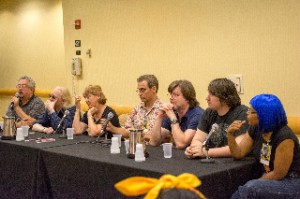Tomorrow, we’re off to the coast for a week of relaxation and recharging. I’ll be working on the second Kye & the Kid novel – no title yet, but it’s all about some mysterious Hawaiian artifacts the lads must track down and return to their rightful owners.

I’ve always found the ocean to be a great place to renew my creative wellspring. Something about sitting on the deck (or porch in this case) with the salt air and the sound of the surf just inspires me to get back to work. I’ve got some good ideas for the latest book, and I’m hopeful that I can get a good bit of the novel reworked.
I know some people would think I’m deluding myself, saying I’m going to the beach to relax and write a novel. But for me, writing is very relaxing, especially when the creative juices are really flowing. I’m looking forward to getting back to the lads and their shenanigans.

Not that I’ve been sitting on my thumbs all this time. Here are some of my recent projects:
- Planning for a Social Media panel at the upcoming Western Fictioneers convention
- Writing my monthly Western Fictioneers blog article
- Writing three e-books (10-50K) under another pseudonym for a small-press publishing house – also have a short story coming out in one of their anthologies next month
- Keeping up my supervisor duties over at WikiAnswers
- Keeping up my daily FaceBook and Twitter posts
- Attending DragonCon and taking their writing workshop
Wow … I’ve been busier than I’d realized. No wonder I’m tired! My next post will be from Garden City Beach!
Advanced Characterization (Michael Stackpole)
All plot comes out of the characters – their needs, goals and interactions
“Your job as a writer is to torture and confuse your readers by torturing and confusing characters.”
7 Traits of Enduring Characters:
- They are always something of a mystery – it is a seduction of the reader by the writer
- They are worthy of redemption – something makes you think they’re capable of change
- They score high on one end of the loyalty-treachery scale
- They are internally consistent and reliable, but capable of generating surprise
- They consistently score high (or low) on self-sacrifice scale
- There is a love story attached to them somewhere
- They are able to succeed at tasks we cannot do
Techniques:
- Character growth vs change – in episodic TV, the characters grow but don’t change (they end up in the same place as they started)
- Change is temporary – characters do what they have to do to get the job done
- Growth is permanent – an internal process as a result of external pressures where character makes a conscious decision to alter their behavior – that decision is key – the reader must know they have undergone growth
- Negative growth is a refusal to change – this is really tough to write – it results in the dissolution of character, and is brutal on reader and writer both
- Reversal – the character believes that a particular fact is true, but learns the opposite – they have to deal with brand new stuff they never thought existed before – the reader will also be shocked – this can be little personal reversals or hidden motivations – look for things you can make not true
- A great technique is betrayal – this creates an injustice, and readers inherently want to see it made right – the easiest are emotional betrayals – you can also have “reader betrayal” such as a love story that doesn’t quite sync up – also, betrayals that are mistakes – whichever sort you use, “emotional churning is absolutely what you want.”
“All fiction is the past erupting into the present.” ~James Sallis
Questions:
- The character wonders who they are, then you write out what they really are
- Who does character want to be? Who does character need to be?
- The character asks, “Who do they think I am? Who they want me to be? Who do they need me to be?”
Historical Fiction and Research (Bethany Kesler)
Start with Google/Wikipedia – get a general idea of what you want, then go for specifics.
Ask “What happened and why should I care?” Nothing happens in a vacuum.
Three Points:
- Authenticity (over accuracy – you’re not an actual historian)
- Plausibility
- Research
Research Tips:
- Look for history texts – brief overviews (“Complete Idiot’s Guide to __”)
- Books written in that era
- Journals and diaries – try college websites/inter-library loans
- Find a historian
- Genealogical societies
- Historical re-enactors
- Historical blogs – Tumblr etc
- Old maps
- Antique stores
- Family history
- Census
- Portraits, paintings
- Try the BBC for UK history
Ask yourself who your characters are? When and where did they exist? Knights in Scotland are very different from Knights in Japan
How you get around can show what era you’re in as well.
Do your general research – then write the novel – add specific research as you go along for what you need – just remember to make notes instead of constantly stopping to search
Editors for Hire (Chantelle Aimee Osman)
Once you’ve written “the end,” the journey is only half over. You must put out the best book you can – if it’s not, you might sell it, but they won’t come back for more.
A clean, polished manuscript can make all the difference – a copy editor is a must if you’re self-publishing and even if you’re going the traditional route, I recommend having your first 5-6 chapters gone over by a professional.
How much editing do you need? Most professional authors might get by with only one edit. Some people need 4-5 edits.
Do a read-only edit yourself before sending it to the editor – catch major errors and over-arching story problems before you send it off for a line edit or line and content edit.
The thing everyone is looking for is your passion on the page. Never write just for a trend. Write what you love to read, what you love to write.
Know your genre – don’t write a zombie vampire YA mystery with Western overtones.
The first two and last two chapters of your book are the most important – have a hook at beginning to make them need to turn the page – no backstory.
Style issues:
- awkward phrasing, repeated phrasing
- do not try to have a unique voice – just write your way and the voice will show through
- the tighter, the better – cut unnecessary words
- preaching is a no-no
- watch for changes in tense or POV
“good dialogue is one of the most difficult and challenges a writer has”
Dialogue problems:
- fake dialogue – not using contractions, very formal, awkward
- dialogue to obviously advanced the plot “radio drama dialogue”
- forced dialogue – do your research
- too many trendy words date your work
- show, don’t tell
- make sure characters have distinct speech patterns
- Read your dialogue (and everything else) aloud
Descriptive problems:
- using the protagonist’s senses to relate information is a better way to show instead of description
- avoid general descriptions (beautiful, nice, etc)
- avoid laundry lists
- watch out for repetition – favorite phrases and images, sentence structure – “crutch words”
- combinations of words with the same meaning
- a set of fresh eyes are valuable in catching these things
- adjectives and adverbs – don’t use too many, never more than one together
- cut 10-15% of your words
- watch “to be” – try to avoid if possible (passive sentences)
- no qualifiers like very or really
- cliches (that also includes cliched descriptions and situations)
- wrong word choices (towards instead of toward, affect/effect, etc)
- watch for sentences with more than two commas – maybe two sentences instead
- now it’s one space after a period
- double check for possessives and plurals
“Punctuation is like a throw-pillow.” Doing the job without calling attention to itself
Errors in character:
- characters must be unique, bring the readers back
- know your characters well, give them clear motivation
- must have goal and clear reason to work toward that goal
- characters must grow
- no stereotypes
- outlandish names – names often paint a better picture than descriptives – you don’t want something that reader must stop reading to figure out how to pronounce it
- misplaced or overly long backstory
Plots:
- if characters just go along without anything interesting happening, there’s no emotional attachment
- every book should have basic essential question (who/what/where/how/why) – know what that question is and be able to resolve it in the end
- don’t write about something you don’t know about
- know your genre!
The End:
- almost as important as the beginning – what’s going to sell the second book
- resolution must make reader feel something
- don’t keep readers wondering in a bad way (forgetting a plot point)
Now you’ve just started on your journey of queries, rejections, edits, cover designs, etc.
Social Media 101 for Creative People (Alison Sky Richards):
3 Points:
- Website (your store front)
- FaceBook (your billboards)
- Twitter (your conversation)
There are around 328 highly utilized social media sites – around 600 total
FaceBook:
- Create an author (or book) page
- Create an author voice
Twitter:
- Be careful who you follow/allow to follow you – spambots and trolls
- Build dialogue and communication – look for your favorite authors and create communication
- Hashtags #amwriting, #amediting – scroll past photos to get to # feed at bottom of screen
Grab your author name on major social media sites – and URL
Websites:
- Responsive design – allow for different devices
- Visual design – images get 10% more response than text
- Appearance – NO Comic Sans! Need an easy to read font like Verdana or Arial – nothing too trendy or crazy. Use tinted background instead of plain white – easier for most people to read. Red is also very visually attractive, but not fire-engine red
- Have your social media integrated
- Search Engine Optimization – takes a lot of work! Need to get a lot of people to look for a specific phrase and click on the website.
- Constantly re-evaluate your website. Check content for freshness and readability – average reading level is 8th grade – recommended website level 6th. Rebrand website to be most effective.
Unraveling the Mystery of Mysteries, by Chantelle Aimee Osman
“A first class mystery is also a first class novel.” ~P.D.James
There are three main elements to a mystery:
- Plot – This is more important in a mystery. Know at least the key points before starting: who/what/where/why? Always start 20 pages after where you THINK it should begin!
- Make sure you have some subplots – romance, etc. Of course, the crime is most important – and it’s not always murder.
- Introduce the crime within the first 3 chapters. Make it believable – do your research. The methods used need to be rational and scientific, and the method of murder should match the killer.
- Clues should be almost invisible. The best ones point in one way but actually say something different if you look at it the right way. You really only need 1-3 really important clues. It’s more the plot and characters.
- You may have heard that “False clues and red herrings are not fair” – baloney! Life’s not fair. Don’t go too far afield with your clues, though – keep them realistic to your world.
- Also -remember that everyone has a secret, so everyone might be guilty.
- Characters – introduce the protagonist and antagonist early. The reader should have some sort of emotional attachment – either like them or hate them.
- Look up the FBI Profile Worksheet and fill it out for your characters – then leave most of that off the page!
- Make sure you actually like your characters!
- Your sleuth should be as unique as possible.
- Backstory should be like bread crumbs – drop a trail instead of dumping everything in the first book.
- Explaining motivation is bad, too – show us action or dialogue.
- Setting – This is often what draws people to the book. Treat setting as another character – don’t adjust it to just to have a place to set the story. Use things and places readers aren’t likely to see, but be accurate.
Also remember: anything that is going to make you jump or jar you out of the story is bad – it’s like bad narration in a movie.
5 Traits of a Highly Successful Writer (William Lavender)
- Confidence in your ability.
- Passion about your work.
- Have a willingness to change.
- Don’t give up when you fail.
- Continue your education.
Like, Love and Lust (Alison Sky Richards):
Reasons someone might not attempt a relationship:
- fearful of losing a friend
- fearful that their feelings won’t be reciprocated
- in another relationship
- uncertain of their own sexual orientation
In a good relationship, the other person completes them in some way:
- Yin and Yang
- Opposites attract
- Similarities
The break-up point is when trust has been broken; the other must re-earn that trust to repair the relationship
“Falling in Love”
- Star-crossed lovers
- Unrequited love
- Love triangles
- Marriage of convenience
- High school sweethearts who meet years later
- Summer flings
- Rich Girl/Poor Boy
- Outcasts
- Instinctual (werewolves, vamps, etc)
- Florence Nightingale
- Finding love when no longer looking for it
When someone is in love:
- they exaggerate their partner’s characteristics (rose-colored glasses)
- they see them as holding important values
- they feel happier/ more hopeful
- they love themselves more
- they feel more attractive and desirable
- they maintain the idealization of “falling in love,” but have a clearer understanding of friends in love
- they make commitments they normally wouldn’t make
- they may not be as jealous of partners (if the relationship is healthy)
- they feel less lonely and isolated
- partners in a healthy relationship learn to tolerate being separated and learn to tolerate intimacy and vulnerability
Barriers that keep a relationship from progressing:
- a checklist of “must-haves”
- wants sex only
- wants love only
- too high an expectation of partner
- fear of change
- putting something else above the relationship
The Joy of Writing Sex (Elizabeth Benedict) – 10 Principles:
- A sex scene is not an instruction manual.
- A good sex scene doesn’t have to be about good sex.
- It’s OK to be aroused by your own writing.
- Your fear is your best friend.
- Sex is nice, but character is your destiny.
- Only your characters know for sure what terms they’ll use.
- Take your cues from your characters.
- Make sure the emotions leading into sex make sense.
- A good sex scene is always about sex and something else.
- Who the characters are to one another is key.
We had an interesting panel on “Social Media: Love It or Hate It” – I think the consensus was “It’s a necessary evil.”

Here are some of the highlights:
Allen Steele provided us with “Steele’s Law” – A writer’s output varies in inverse proportion to the time they spend on social media.
Jim Menz: It’s always been an author’s job to market – it’s just easier now with social media
Jeanne Stein: When I sold my first book, I thought I was going to get a publicist who would do everything for me … but if all you ever say is “Buy my book,” it’s not going to work.
L.M. Davis explained a bit about how different social media platforms are popular with different ages. Right now, teens and young adults are more often found on Instagram and Twitter, while Facebook serves an older crowd.
The bottom line from all speakers was: if you’re not comfortable in the medium, don’t use that one. If you don’t like posting photos, stay away from Instagram and Pinterest. If you don’t plan to share several times a day, Twitter probably isn’t for you.
Roger Bellini: You have to have a social media presence as an author
Allen: There’s always the Baskin-Robbins Theory – give away the first taste free. What we’re talking about is coming up with strategies for yourself – use your website as information for the world.
Jim: Having something smart to say is better than pitching your book – it’s about the content, not the format
Stephen Antczak shared stories of how he’s reached out to authors on social media when he didn’t have an email address – he’s even used it to find work as a movie or TV extra!
Busy packing everything up and getting ready for the drive back home, so just a short-short for now – click HERE. Don’t worry, there are still plenty of DragonCon posts in the works!

Here are some more gems of wisdom from the experts at the Writer’s Track.
Nancy Knight: Never start a sentence with a semicolon.
Georgia McBride: This business runs on new material – we need it and we want it – but the submission guidelines are there for a reason.
Claire Eddy: If you have five editors, you have seven opinions.
Anthony Francis: My first advice is to write. Don’t think about it, don’t look for a market or an agent – just keep writing until you’re finished.
John Hartness: The Book of Your Heart – that Great Project you’ve been working on since high school – finish the piece of shit and shove it into a drawer. This is a business.
Debra Dixon: You’ve got to get some rejections or you have nothing to talk about at the bar.
Nancy Knight: There are two things you need – storytelling and technical ability.
There are even more great panels scheduled for today, too!
Some really good advice from Kevin J. Anderson and his wife, Rebecca Moesta. The panel was entitled “Things I Wish Some Pro Had Told Me.”
Here are some of the highlights:
- Always be professional. Dress professionally whenever you appear as your author-self. Act in a professional manner at all times – especially when you are online. It’s easy to forget that “The internet is forever” and say or do something unprofessional. An author is a public persona, so prepare to be “on stage” at any time.
- Always be kind. There is nobody so unimportant that you can afford to be unkind to them. Everyone is a potential reader, a fellow author, an editor or agent or publisher – and you don’t know who is who most of the time, so treat everyone politely. That author you dissed in public or on Facebook might just end up editing an anthology you really want to be part of.
- Don’t whine. If someone else has better success than you, don’t act like a child and complain about how much better your work is – get back to writing and prove it. Don’t bitch and moan about that short story assignment – turn it in and be grateful you have the opportunity. Nobody likes a whiner.
- Always do your best. No matter what you write, it’s going to be somebody’s introduction to your work. Make sure it’s a good example.
- Get used to rejection. Kevin’s first writing award is a trophy he got for having the most rejection slips at a conference. Rejection doesn’t mean you’re a failure – it means that particular editor or agent or publisher, for whatever reason, doesn’t want that particular work at that particular time. You have to put your best work out there until it sells.
- Don’t quit your day job. Writing is a risky business. Kevin and Rebecca have to write one extra book each year just to pay for health insurance. If you’ve got a job, no matter how little you like it, keep it for the benefits. When you’re regularly making the best-seller lists and have a couple of years’ worth of expenses in the bank, you can think about writing full time. Until then, play it safe.
Kevin and Rebecca’s website is a great place to read more. It also has a link to their publishing house and the writing seminar they run, called Superstars.
I’m off for DragonCon in an hour or so … I’ll be doing a lot of Facebook and Twitter posts to keep you up-to-date (and wanting to go for yourself next year!)

HERE’S a good link to some handy Twitter tactics for you!










